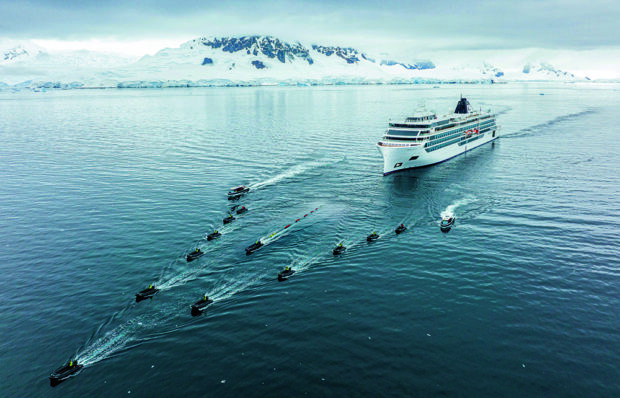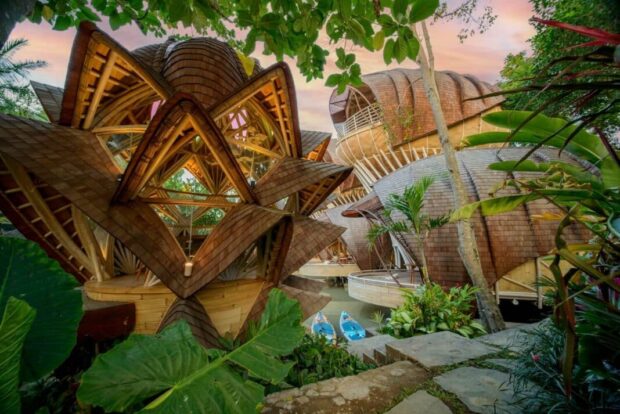More travellers are seeking eco-friendly vacations, leading to a rise in eco-tourism and conservation-focused holidays. These trips offer a rewarding way to enjoy nature while helping protect our planet’s biodiversity. They allow people to explore beautiful destinations and actively contribute to environmental preservation.
Eco-Friendly Cruising Options for 2025

Eco-friendly cruising is becoming a significant trend, and several cruise lines are leading the charge by integrating sustainability into their operations. For instance, Hurtigruten offers cruises designed to minimise environmental impact, using hybrid technology to reduce fuel consumption and CO2 emissions.
Their itineraries are crafted to raise passenger awareness about the fragility of the ecosystems they visit, particularly in the polar regions, where the impact of climate change is most apparent.
Another notable example is the Celebrity Apex, which operates with one of the industry’s most advanced wastewater treatment systems. It utilises air lubrication technology to ensure the ship glides more efficiently through the water, reducing drag and fuel consumption.
Celebrity Cruises also adheres to strict energy efficiency and waste management protocols to enhance sustainability efforts.
For those planning their 2025 vacations, the cruise and stay 2025 packages offer an innovative approach to eco-tourism. Combining traditional cruising with extended stays at eco-friendly destinations, these packages allow travellers to immerse themselves more deeply in local environments while contributing to their preservation.
For those interested in travelling and contributing positively to conservation efforts, Lindblad Expeditions collaborates with environmental organisations to support conservation initiatives.
These cruises often include lectures and workshops led by conservation experts, offering insights into sustainable practices and the importance of preserving natural habitats.
MSC Cruises is also powering its ships with Liquefied Natural Gas (LNG), one of the cleanest marine fuels currently available. It is committed to achieving zero emissions in its operations in the future.
This effort is part of a broader plan that includes various energy-efficient improvements and onboard recycling programs, setting a high standard for others in the industry.
Wildlife and Nature Reserves to Visit

Exploring nature reserves during a cruise can turn a simple vacation into an enriching educational experience, especially when you visit places like the Danum Valley in Borneo.
This conservation area is renowned for its rich biodiversity, including endangered species like orangutans and clouded leopards.
Cruises in the region often offer excursions that allow travellers to trek through the lush rainforest, guided by experts who explain the critical conservation efforts in place to protect these unique ecosystems.
In the Galapagos Islands, eco-tourism is taken to another level with small-ship cruises designed to have minimal environmental impact. Here, travellers can enjoy close encounters with the archipelago’s unique wildlife, such as marine iguanas and giant tortoises.
The cruises often include visits to research stations and guided tours by naturalists who share insights into the ongoing efforts to preserve the islands’ delicate habitats and species.
The Amazon Rainforest is another spectacular destination where cruises focus on conservation and sustainable tourism. Ships like the Aria Amazon take guests deep into the heart of the rainforest, offering skiff excursions to explore remote tributaries, view wildlife, and visit local communities practising sustainable agriculture and crafts.
These experiences are designed to educate travellers about the critical importance of the Amazon to global ecology and the threats it faces.
Closer to home, Alaska’s Inside Passage offers a cruise route where travellers can witness majestic glaciers and an array of marine life, including humpback whales and sea otters.
Many cruise lines collaborate with local wildlife organisations to provide guests with opportunities to learn about wildlife rehabilitation and conservation efforts directly from the researchers and caretakers involved.
This responsible travel approach ensures that tourism supports conservation efforts while offering travellers a deeper understanding of the natural world.
Choosing Eco-Friendly Accommodations

Selecting eco-friendly accommodations is an essential step for any conservation-focused traveller. Hotels like the GreenTree Inn in Singapore distinguish themselves by using solar panels and energy-efficient lighting throughout their properties.
These establishments prioritise the reduction of their environmental footprint, ensuring that your stay is as sustainable as it is comfortable.
Another notable example is the Bamboo Eco Resort in Bali, Indonesia, constructed entirely from renewable materials.
The resort employs rainwater harvesting systems and treats its wastewater naturally to avoid polluting the local ecosystem. Guests can enjoy the natural beauty of Bali while supporting a facility that embodies faithful environmental stewardship.
In Thailand, the Eco Lanta Hideaway Beach Resort on Koh Lanta offers a unique experience where conservation meets luxury. The resort’s design minimises energy consumption, and its operations focus on preserving the surrounding marine life.
Using biodegradable products and active participation in local beach clean-ups demonstrate a commitment to maintaining the island’s pristine nature.
For those venturing to Japan, the Ecohotel Kyoto is worth noticing. Nestled in a city known for its blend of tradition and modernity, this hotel offers state-of-the-art amenities that conserve energy and water, proving that comfort does not have to come at the expense of the planet.
By staying at such properties, travellers directly contribute to the sustainability of these destinations, enhancing their travel experience with peace of mind about their environmental impact.
Packing for an Eco-Tour

Packing for an eco-tour requires a thoughtful approach to minimise environmental impact while travelling. Items like reusable water bottles are essential; they reduce reliance on single-use plastics and are handy in areas where water quality may vary.
Opt for durable, non-toxic stainless steel bottles, perfect for keeping water cool during long excursions.
Biodegradable toiletries are another must-have. Brands like Dr. Bronner’s offer products, from soaps to toothpaste, made from natural ingredients and recyclable materials.
These products ensure that you leave no harmful residues in local waterways, an important consideration when visiting sensitive ecosystems.
Packaging a lightweight, durable backpack made from recycled materials is crucial for day trips and hikes. Companies like Patagonia and Osprey produce eco-friendly bags that withstand rugged use and affirm a commitment to sustainability through responsible manufacturing practices.
Solar-powered chargers are indispensable for eco-tourists. These devices ensure you can keep your essential electronics charged without relying on non-renewable energy sources. They are instrumental in remote locations where power outlets may be scarce, allowing you to capture and share your experiences without a high environmental cost.


